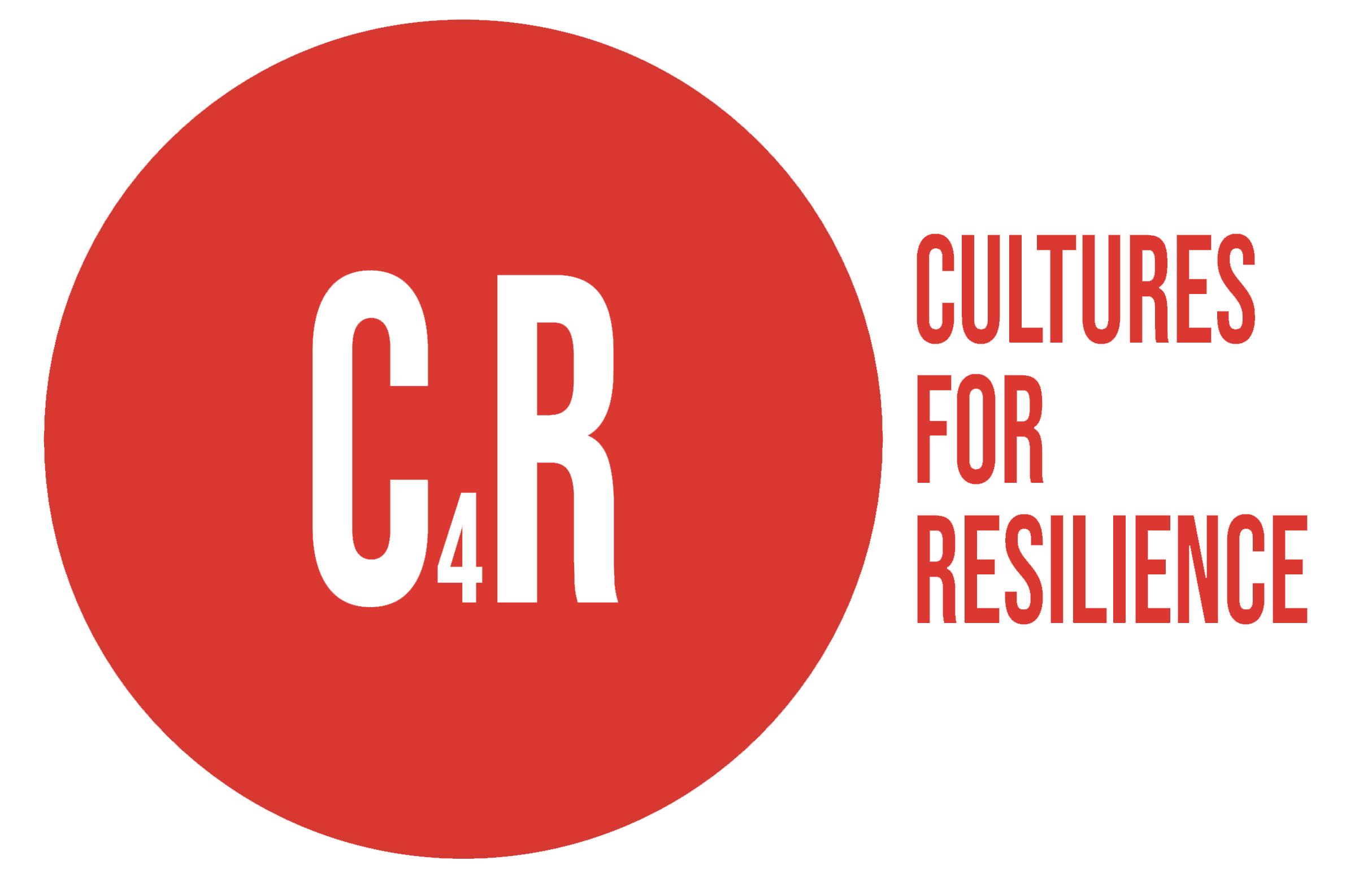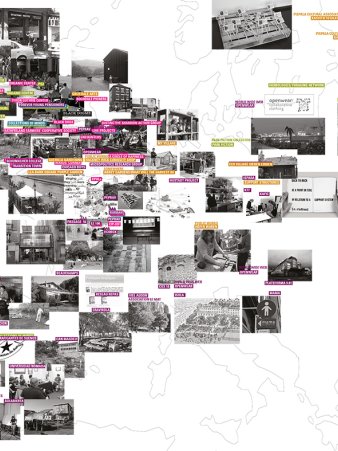The C4R project aims to foster resilient and inclusive European societies by developing participatory cultural practices of resilience and ensuring social transversality.
Faced with ecological emergency and being responsible for 70% of GHG emissions, cities need to reduce drasticly their carbon emissions while preparing territories for future challenges (heat waves, agricultural droughts, floods). The environmental consequences to come are likely to increase inequalities, weakening social cohesion and reinforcing ecological segregation: rich/poor, North/South, central/periphery. This is why we need to increase the resilience of all European territories, their capacity to adapt to shocks and then recover. Culture appears to be a structural tool for establishing sustainable economic and social development. The C4R project is part of this research framework and suggests developping a holistic approach to relience by using immersive cultural practices as a gateway to develop ecological, social and economic resilience practices and promote capacity building, learning and education in peripheral territories. For several years, the three members of the C4R consortium (an interdisciplinary architecture collective in Paris, an art institute in Utrecht acting for social changes and a network of art centres in Iasi and Bucharest) have specialised in the implementation of participatory and transversal processes of creative immersion and intersection between culture and ecology. These 3 structures witness the lack of knowledge on resilient cultural practices, the marginalization of populations in neighbourhoods outside traditional cultural centres, the over-visibility of a catastrophist culture combined with a phenomenon of identity withdrawal. All these factors are now holding back the emergence of resilient and inclusive European societies.
The C4R project aims to foster resilient and inclusive European societies by developing participatory cultural practices of resilience and ensuring social transversality.
In other words, the project aims to (1) experiment with audiences of peripheral territories a certain number of bottom-up dynamics (2) around creative immersive tools aiming to reinvent and disseminate cultural practices of resilience (3) with the active involvement of populations from underprivileged neighbourhoods. We seek to use culture to strengthen the resilience practices of these populations and their appropriation of new tools for sustainable resilient societies. (1) To this end, the project first seeks to promote European diversity of resilient cultural practices while strengthening social inclusion within disadvantaged urban and peri-urban territories. Based on the partners' experience in managing projects combining culture and ecology in peripheral areas, such as the Mathurins district in Bagneux, the Agnettes district in Gennevilliers (FR), Sararie and Tatarasi districts in Iasi (RO) or the Leidsche Rijn district in Utrecht (NL), the aim is to continue developing activities combining creation, preservation and awareness of cultural and natural heritage and strengthening the civic and democratic capacities of inhabitants. The objective is to contribute to the empowerment of the populations involved in the project by enabling them to appropriate cultural tools for resilience. The resilience oriented cultural activities will create opportunities for a dialogue between the scale of these disadvantaged urban and suburban territories and the European scale, as most relevant scale for developing long-term ecological cultural action. These new cultural practices will place the audience in a proactive position in the creation and dissemination process, contributing to their empowerment by enabling them to acquire new skills and capacities (creative skills, digital skills, abilities for working in teams and with people from various backgrounds, workshop facilitation skills, etc.). The project will enable a wide range of audiences across sectors to embrace the concept of resilience and offer opportunities of training for the consortium members to support this process. The project will raise awareness among these audiences about the on-going resilience issues while strengthening social cohesion and well being. (2) Second, the project aims to use culture as a tool for achieving resilient and sustainable economic and social development in peripheral territories. At the operational level, the project seeks to strengthen the capacities of the consortium members and other existing cultural actors and the emergence of new creative actors engaged in cultural practices related to resilience and ecology. It will support creative professionals, both existing and emerging and increase the frequency of resilient cultural activities organised in peripheral territories (collective gatherings and herbaria, sensitive walks, alternative agricultural practices such as permaculture and agro-ecology, composting, creative and collective cooking methods, etc.). This strengthening of cultural dynamics, already promoted by the consortium members in recent years, will improve the visibility of these practices at all levels (local, national, European), contributing to strengthening the networks of cultural and resilience actors at the level of territories involved (SMEs, associations, public and private operators in the field of resilience and culture). (3) Finally, the project seeks to introduce more co-constructed, positive and sustainable cultural visions of resilience into the collective European imaginary. The objective is to show a diversity of possibilities and approaches to an ecological future, by promoting other perspectives than those of the large metropolises and the catastrophic visions that currently dominate the scenarios of the future.
C4R offers conditions for the production and dissemination of a diversity of cultures of resilience to counterbalance the over-hype of catastrophist productions and to influence and transform European collective imaginaries. During C4R, networks of the actors will develop a culture of translocal resilience within the EU, through the creation of spaces for physical and digital dialogue and collaboration.
The C4R partners are currently developing cultural projects in peripheral territories located in very diverse European regions (Paris, Utrecht, Bucharest and Iasi) and have already experimented audience segmentation strategies as well as developing tools to reference the diversity of target audiences (relational mapping, learning activities with children, gardening, reading groups, organic internet) Thus, the target groups are single women (and their children), unemployed people, pensionaries, people in professional reskilling, people with disabilities, religious and cultural minorities, young art professionals and students. Working on the "Right to resilience" and the advent of the inclusive city, AAA has been developing the R-Urban strategy since 2008 by setting up civic facilities (urban and educational farms, spaces for reuse and recycling, etc.) to promote the development of short ecological, economic, social and cultural circuits at the neighbourhood level. Similarly, the CASCO Art Institute co-manages farmhouses in the Leidsche Rijn district. The site regularly hosts resilient cultural activities (crop displays, transformation of space through architectural interventions, artistic and educational activities around nature, biodiversity, sustainable food). These places offer the opportunity to collectively rethink ways of constructing more horizontal and collaborative exchanges that are essential to the construction of active democratic citizenship. Beyond spatial inclusion and cultural justice, the inclusive city must integrate users into creative management processes. C4R propose to develop digital tools accessible to the many, in order to reduce the current digital gap, especially between generations and social backgrounds. For example, the project could propose the deployment of small scale DIY wireless networks including customized self-hosted services like NextCloud, Etherpad, attached to specific geographic locations, a sort of organic Internet). These facilities and tools are managed according to principles of common goods (a shared resource co-managed by a community of beneficiaries). Thus, the C4R actions seek to equip citizens with new creative capacities essential for participating in democratic life and for meeting future challenges (care practices, knowledge sharing, services and equipment, cooperation and teamwork) while strengthening social cohesion and well-being within territories. By creating social cohesion, culture helps to bring marginalized individuals out of their isolation, the C4R project is part of a cultural field defined by numerous cross-sectoral activities. In parallel, the development of local ecological, cultural and economic circuits and the networks of local actors strengthen resilience within territories while establishing sustainable European competitiveness. Culture is an entry point to strengthen the resilience of these territories, thus offsetting the excessive segregation and individualisation of current societies. Our implementation strategy is based on the following innovative governance principles: immersive cultural practices which place the audience at the centre of the process, active and collaborative participation and the implementation of new learning practices based on peer-to-peer and "learning by doing". Through setting up different type of activities which support the active involvement of different social, profesional and cultural categories of citizen in knowldge exchange (WP 2+3), C4R follows innovatively the EU politics which encourage “Promote the arts, culture and creative thinking in formal and non-formal education and training at all levels and in lifelong learning“. Based on commoning governance principles, we have identified some key strategic priorities such as working with the audience in different territories to create a laboratory of resilient cultural practices and conducting participatory workshops for identification, inventories and mapping to develop a vision of the territories that comes from those who live there as well as a dissemination through a hybrid platform and underpinning activities guaranteeing the possibility of replicability in other European territories.

